新概念英语第一册Lesson 131-132课件(共70张PPT)
文档属性
| 名称 | 新概念英语第一册Lesson 131-132课件(共70张PPT) | 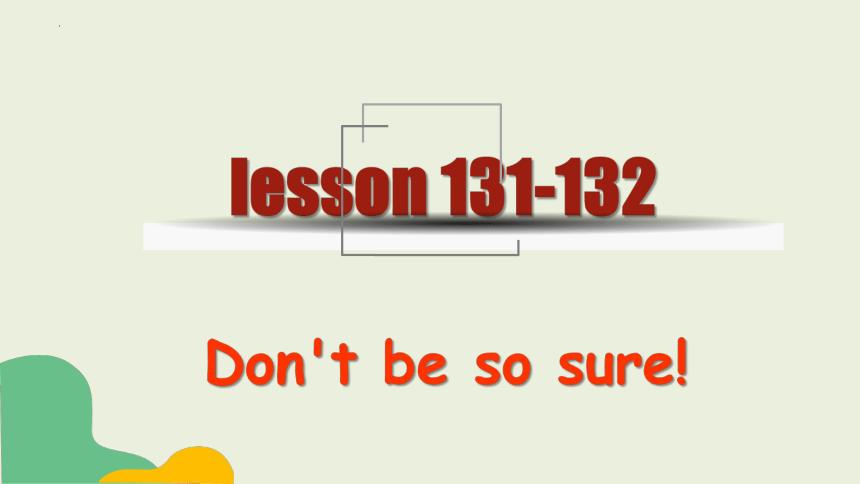 | |
| 格式 | pptx | ||
| 文件大小 | 6.8MB | ||
| 资源类型 | 教案 | ||
| 版本资源 | 新概念英语 | ||
| 科目 | 英语 | ||
| 更新时间 | 2024-01-08 20:18:49 | ||
图片预览

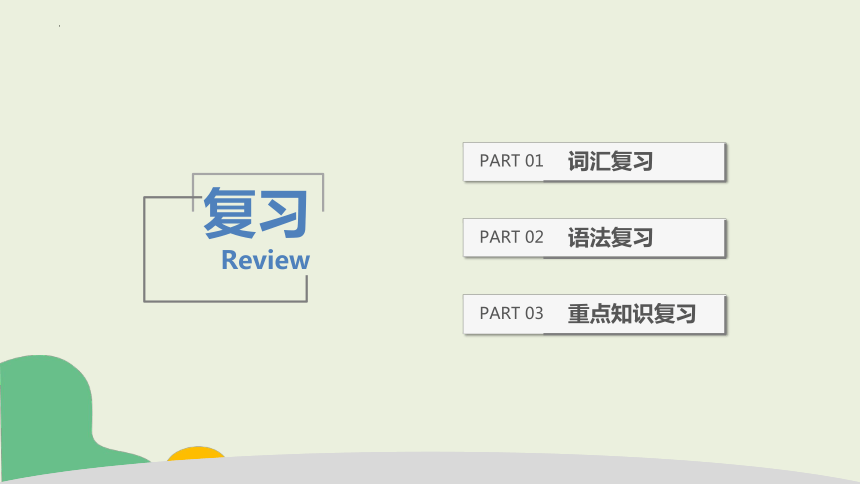
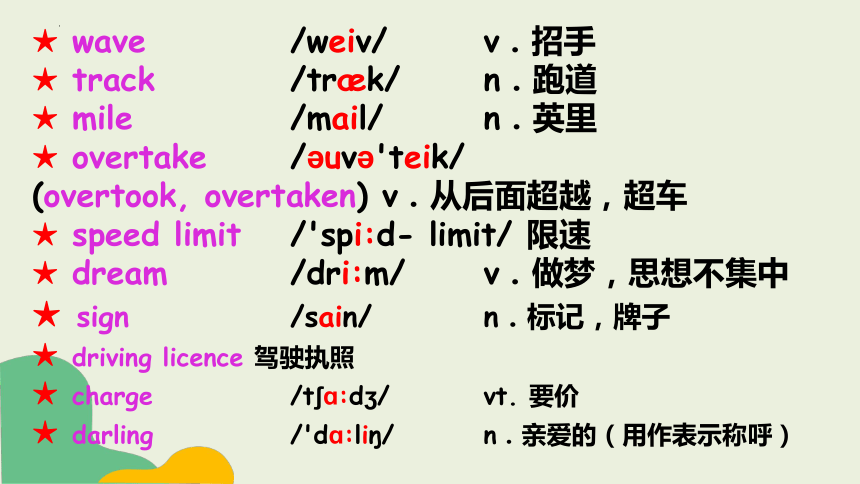

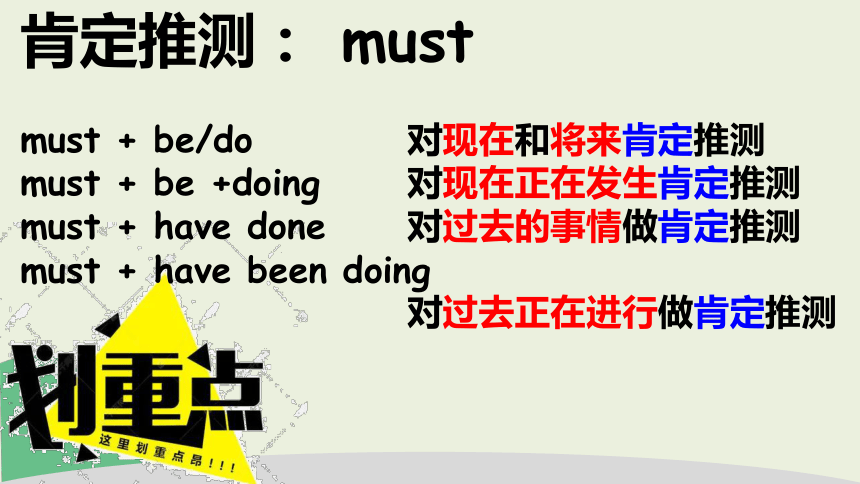
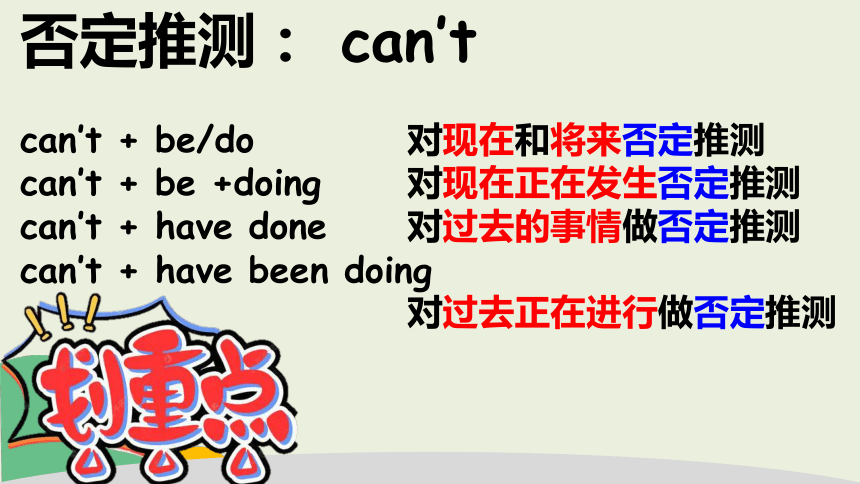
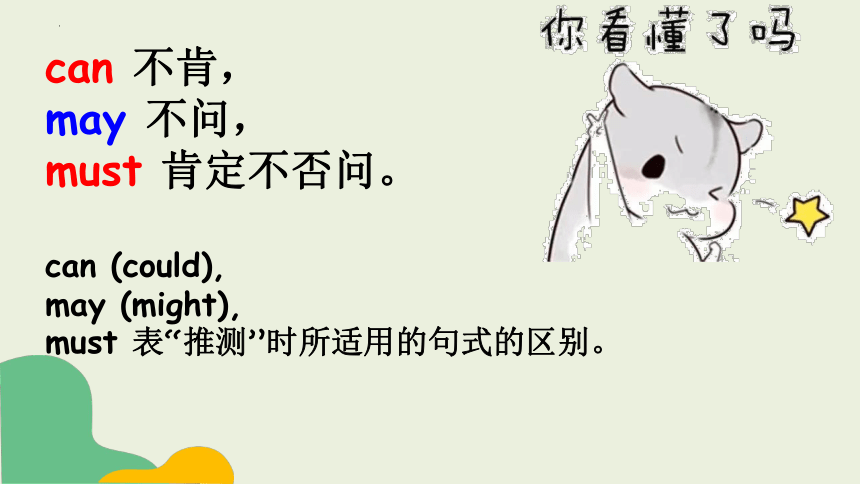
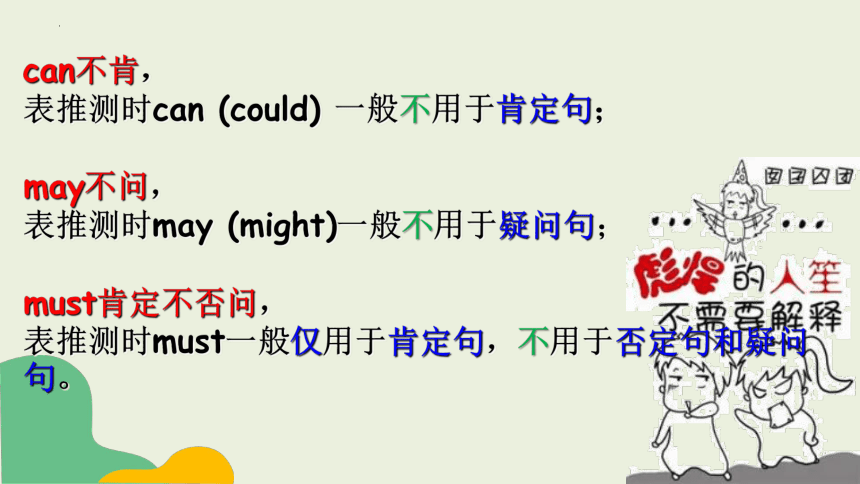
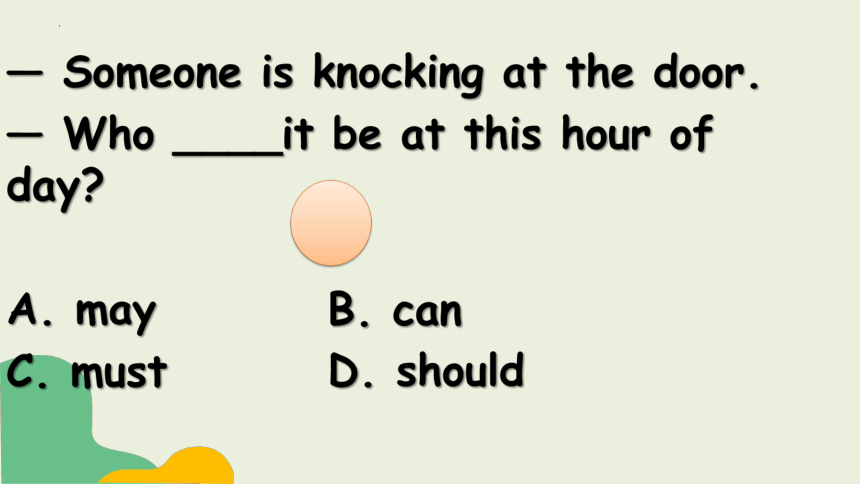
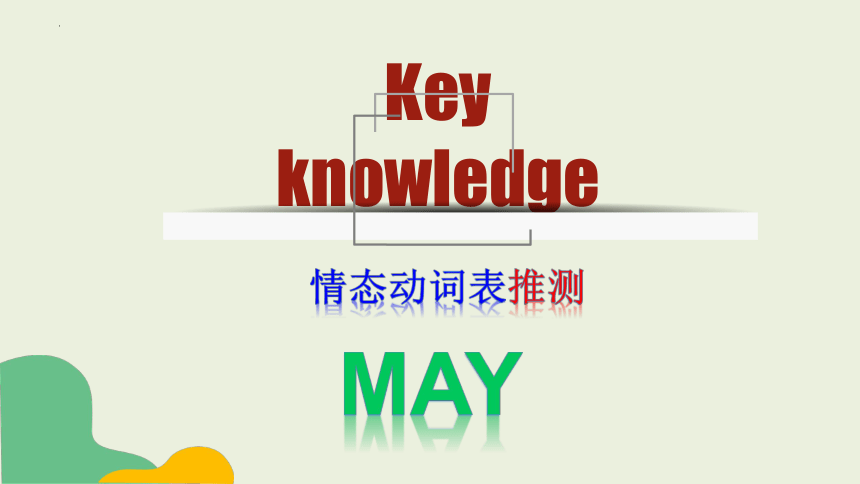
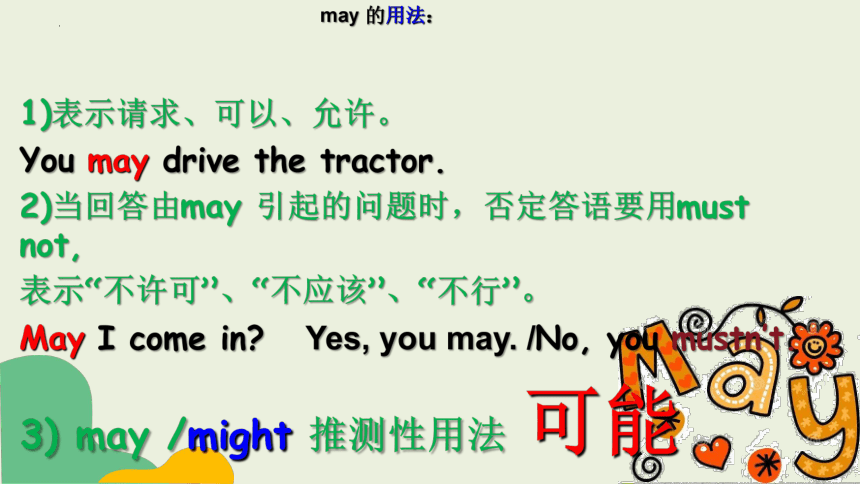

文档简介
(共70张PPT)
lesson 131-132
Don't be so sure!
PART 01 词汇复习
复习
Review
PART 02 语法复习
PART 03 重点知识复习
★ wave /weiv/ v.招手
★ track /tr k/ n.跑道
★ mile /mail/ n.英里
★ overtake / uv 'teik/
(overtook, overtaken) v.从后面超越,超车
★ speed limit /'spi:d- limit/ 限速
★ dream /dri:m/ v.做梦,思想不集中
★ sign /sain/ n.标记,牌子
★ driving licence 驾驶执照
★ charge /t ɑ:d / vt. 要价
★ darling /'dɑ:li / n.亲爱的(用作表示称呼)
Key knowledge
情态动词表推测
肯、否
肯定推测: must
must + be/do 对现在和将来肯定推测
must + be +doing 对现在正在发生肯定推测
must + have done 对过去的事情做肯定推测
must + have been doing
对过去正在进行做肯定推测
否定推测: can’t
can’t + be/do 对现在和将来否定推测
can’t + be +doing 对现在正在发生否定推测
can’t + have done 对过去的事情做否定推测
can’t + have been doing
对过去正在进行做否定推测
can 不肯,
may 不问,
must 肯定不否问。
can (could),
may (might),
must 表“推测”时所适用的句式的区别。
can不肯,
表推测时can (could) 一般不用于肯定句;
may不问,
表推测时may (might)一般不用于疑问句;
must肯定不否问,
表推测时must一般仅用于肯定句,不用于否定句和疑问句。
— Someone is knocking at the door.
— Who ____it be at this hour of day
A. may B. can
C. must D. should
Key knowledge
情态动词表推测
may
may 的用法:
1)表示请求、可以、允许。
You may drive the tractor.
2)当回答由may 引起的问题时,否定答语要用must not,
表示“不许可”、“不应该”、“不行”。
May I come in Yes, you may. /No, you mustn’t.
3) may /might 推测性用法 可能
He may be right.
may/might 表示 可能性
may或might都表示“可能”、“也许”,
不过might所表示的可能性要比may小。
1)现在或将来的可能性:may/might+动词原形:
The bread may be fresh.面包可能是新鲜的。
I may go abroad.我可能出国。
They may offer me a job.他们也许会给我提供一份工作。
may/might 表示 可能性
may或might都表示“可能”、“也许”,
不过might所表示的可能性要比may小。
2)现在正在做某事的可能性:
may/might+be+doing:
He may be reading.他可能正在看书。
may/might 表示 可能性
may或might都表示“可能”、“也许”,
不过might所表示的可能性要比may小。
3)表示过去做了某事的可能性:
may/might +have done:
他迟到了。他可能一直很忙。
He was late. He may have been busy.
她可能读过这本书了。
She may have read the book.
may/might 表示 可能性
may或might都表示“可能”、“也许”,
不过might所表示的可能性要比may小。
4)表示过去某时正在做某事的可能性:
may/might +have been doing:
我昨天晚上出去了,她可能一直在看书。
I went out last night, and she may have been reading.
May 表推测“可能…”
may/might+be/do→对现在或一般情况的推测
may/might+be doing
→对现在或将来正在进行的事情的推测
may/might+have done→对过去情况的推测
may/might+have been doing
→对过去正在进行的事情的推测
1.只用于肯定和否定句中,不用于疑问句中。
2.might 比may可能性更小
may not 可能不 can not 不可(不可能)
3.表建议(可和as well 连用)
You may(might)as well stay where you are.
还是待着那的好
4.表祝愿may sb. do sth. “祝愿某人
祝你成功! May you succeed!
祝你玩的愉快!May you enjoy yourself
注意:
Key knowledge
另
might
might
1)表过去的“可能”和“允许”多用于间接引语。
She said that he might take her dictionary.
2)表现在的“可能”,其可能性要比may小。
Electric irons could be dangerous; they might give you a severe shock.
电熨斗会有危险,它可能电着人。
3)may (might) + have +done 表示对过去发生行为的推测,含有“想必”、“也许是”的意思。
It may have been true.
总结:情态动词表示推测
根据推测可能性的大小,以此为:
must(一定)>should(很可能) > could(可能) >may(可能) >might(或许) >can’t(不可能)
can用于疑问句中。
Where is Amy
1)She must be in her room.
I'm sure she is in her room.
2)She can't be in her room.
I'm sure she isn't in her room.
3)She may be in her room.
I'm not sure she is in her room.
4)She may not be in her room.
I'm not sure she is in her room.
一定
不可能
可能
可能不
单词必须积累
words
★ Egypt /'i:d ipt / n. 埃及
★ abroad / 'br :d / adv. 国外
★ worry / 'w ri / v. 担忧
★ look after v.照顾 照看
★ make up one's mind 下定决心
★ in the end 最后
★ Egypt /'i:d ipt / n. 埃及
They come from Egypt.
Egyptian n. 埃及人,埃及语
/i d p n/ adj. 埃及的
abroad adv. 国外 =overseas
His son is still living abroad.
go abroad 到国外
travel abroad 到国外旅行
study abroad 海外留学
home and abroad 国内外
★ abroad / 'br :d / adv. 国外
v. 担忧;发愁 worry + sb 担心某人
犯什么愁呢?What’s worrying you
妈妈总是担心太多,让她感到很累
Mum always worries too much and it makes her tired.
worry about 为…担心
别担心那件事 Don‘t worry about it.
worried adj. 烦恼的,焦虑的
be worried about 为…担心
Tony was worried about his test.
★ worry / 'w ri / v. 担忧
★ look after v.照顾 照看
谁将去照顾这个狗
Who is going to look after the dog
谁将去照顾这个花园
Who is going to look after the garden
make up one's mind 下定决心
我们不能下定决心
We can't make up our minds
in the end 最后
最后,我们呆在家照顾每一样东西
In the end, we stay at home and look after everything.
课文串讲
Don't be so sure!
MARTIN: Where are you going to spend your
holidays this year, Gary
GARY: We may go abroad. I'm not sure.
My wife wants to go to Egypt.
I'd like to there, too.
We can't make up our minds.
MARTIN: Will you travel by sea or by air
GARY: We may travel by sea.
MARTIN: It's cheaper, isn't it
GARY: It may be cheaper, but it takes a
long time.
MARTIN: I'm sure you'll enjoy yourselves.
GART: Don't be so sure.
We might not go anywhere.
My wife always worries too much.
Who's going to look after the dog
Who's going to look after the house
GART: Who's going to look after the garden
We have this problem every year.
In the end, we stay at home and look
after everything!
课文详解
Don't be so sure!
1.Where are you going to spend your holidays this year, Gary
spend v. 花费时间,金钱,度过时光,假日等
(1).spend….on sth
(2)spend ….(in) doing sth
她把大量的钱花在(买)衣服上。
She spends a lost of money on clothes.
(3)当“度过“讲时句型结构为:
spend + n.(时光,假日)+地点状语
我打算到悉尼度假。
I am going to spend my holidays in Sydney.
我在一个小城镇度过了我的童年。
I spent my childhood in a small town.
“花费”
1. It takes sb. 时间 to do sth. (做某事花了某人多少时间)
It takes me 5 minutes to go to school.
2. sb.+ pay + 钱 + for + sth. (某人为某物花了多少钱)
I pay 5 yuan for the pen.
3. sth. + cost + sb.+ 钱 (某物花了某人多少钱)
The pen costs me 5 yuan.
4.We may go abroad.
may 情态动词“可能,也许,或许“
明天也许会下雪。
It may snow tomorrow.
如果我忙的话,也许就不去了。
If I’m busy, I may not go.
5.I’m not sure.
1).be sure 肯定
2).be sure of/ about + n. 对…有把握
他稳操胜券 He is sure of success.
3).be sure that…. 肯定,确信
他确信自己会成功 He is sure that he will succeed.
4).be sure to do 肯定,一定,务必
一定要在5点钟给我打电话 Be sure to call me at 5 o’clock.
5).for sure 肯定的,有把握的
他们半个小时肯定会到。
They will be here for sure in half an hour.
6).make sure 查明,确定
请确定这个房子已经上锁了。
Please make sure that the house is locked.
7).to be sure 确定,的确,固然,后面多接but
的确,他人很不错。
To be sure, he is kind.
的确,父亲并不富有,但他是个绅士
Father isn’t rich, to be sure, but he is a gentleman.
8).sure (口语)“当然可以“ 相当于certainly
我能开窗吗?当然!
May I open the window Sure!
6.My wife wants to go to Egypt. I’d like to go there, too. We can’t make up our minds.
1)would like to do sth 愿意做某事,想做某事
你想看看你的房间吗?
Would you like to have a look at your room
2)would like sth 想吃(喝,得到)某物
想来杯茶吗?
Would you like a cup of tea
7.make up one’s mind 下决心,决定
我还没打定主意。
I haven’t make up my mind yet.
8. Will you travel by sea or by air
选择疑问句要求答话人在两个或更多人或事物中做出选择,不能用yes 或no 作回答。
你想吃香蕉还是苹果?
1.--Would you like some bananas or apples
我想来个苹果 --I’d like an apple.
你是医生,老师还是科学家?
2. Are you a doctor, a teacher or a scientist
都不是,我是学生。 None of them. I am a student.
9.We may travel by sea. It’s cheaper, isn’t it
反意疑问句 :根据事实情况来回答
你是学生,不是吗? 是的,我是。
You are a student, aren’t you Yes, I am.
不,我不是。我是个牙医。 No, I’m not. I am a dentist.
你不会乘船去吧,会吗?
You won’t travel by sea, will you
不,我要乘船去。
Yes, I’ll go by sea.
10.It may be cheaper, but it takes a long time.
take 花费,占用
It takes sb some time to do sth 做某事占用了某人…时间
做这件事用了我1小时的时间。
It took me 1 hour to do the job.
我花了1小时来做这项工作。
I spent one hour doing the job.
11.I’m sure you’ll enjoy yourselves.
enjoy oneself=have a good time 玩得愉快=have fun
暑假你玩得痛快吗?
Did you enjoy yourself during the summer vacation?
Did you have a good time during the summer vacation?
12.Don’t be so sure. We might not go anywhere.
might 表示非常不确定
anywhere 任何地方,副词作状语
somewhere某地,用于肯定句
nowhere 没有任何地方
我想去转转,但是因为下雨了,我哪也没去。
I wanted to go somewhere, but because of the rain, I went nowhere.
12.My wife always worries too much. Who's going to look after the dog Who's going to look after the house Who's going to look after the garden We have this problem every year.
too much= much 多
much too = too 太
look after 照看,看管
look at注视 look for寻找
look into调查 look around环顾
look forward to doing sth. 渴望做
13.In the end, we stay at home and look after everything!
in the end 最后,到头来,说明结果
finally 最后,说明次序
at last 最后,终于(说明目的的实现)
课文详解
祈使句的反义疑问
祈使句:
表达命令、请求、劝告、警告、禁止等的句子,
主语you常省去...。
祈使句的四种句型:
1)、do/动词原形+句子其他成分 Do型
Sit down, please.
2)、be+表语(adj./n.)+句子其它成分 Be型
Be careful!
3)、let+宾语+动词原形+句子其它成分 Let型
Let’s play basket ball = Let us play basketball.
4)、 在公公场合的提示语中,一般用No+名词/动词-ing形式用来表示禁止的祈使句。如:
No photos! No fishing!
祈使句否定形式:
以上三种句型的否定形式都可以在句首加don’t。
其中 Let型的否定形式有两种,
除在句首+don’t外还可以在
动词原形前即宾语后+not。
1. Don’t sit down.
2. Don’t be careful.
3. Don’t let us play basketball.
或 Let us not play basketball.
祈使句的反义疑问句:
1、祈使句为肯定句式时,
若其翻译疑问句表示请求时,通常用will you;
表示邀请、劝说时,用won’t you.如
Be sure to ring me, will you 记得打电话给我,好吗?
Come to have dinner with us this evening, won’t you
今天晚上和我们一起吃饭,好吗?
祈使句的反义疑问句:
2、祈使句为否定句时,
其反义疑问句通常只用 will you.
Don’t smoke in the meeting room, will you 不要在会议室抽烟,好吗?
祈使句的反义疑问句:
3、Let开头的祈使句构成反义疑问句时,
除Let’s用shall we外,
其他均用 will you.如:
Let’s take a break,shall we 我们休息一下,好吗?
Let the boy go first, will you
让那个男孩先走,好吗?
课文详解
祈使句的反义疑问
回答
祈使句的回答
祈使句的动作通常表示将来发生的动作,
所以回答时一般用will或won’t.
回答具有否定意义的祈使句时,要注意两点:
一是:形式一致,即Yes与will保持一致,No与won’t保持一致;
二是:意义相反,即Yes是 不 的意思,No是 是 的意思。要根据语境来判断
--Don’t go out, please! It’s raining heavily outside.
--Yes, I will. I have to meet my brother at the airport.
Phrases
go abroad
I’m not sure.
go to Egypt
make up one’s mind
may be
take a long time
Don’t be so sure.
too much
look after
in the end
1. 去国外
2. 我不敢肯定
3. 去埃及
4. 拿定主意,下定决心
5. 可能是
6. 花很长时间
7. 别那么肯定
8. 太多
9. 照看,照顾
10.最后
课文详解
练习
情态动词专项练习
( ) 1.Martin and Gary___ go abroad,
I’m not sure.
A.can B、might C、will
( ) 2. I may ____ so, but I can’t remember
whether I did it or not.
A. say B、be saying C、have said
( ) 3. --Did your brother break the window
-- I don’t know .but he ___have done it .
A. would B、may C、will
( ) 4. ---You must be here at 5:30 tomorrow
morning.
---Sorry, I ___ be here so early.
A. needn’t B、mustn’t C、can’t
B
C
B
C
( )5. Do you think they are butchers
I’m not sure. They _____ be bakers.
A must B、may C、have to
( ) 6. Don’t be so sure .
We might not go ______.
A everywhere B、anywhere C、left
B
B
Exercise
1.—Where are you going for your holiday
—I’m not sure. We _________ go to Egypt.
A must B might C are D /
2.I can’t ________ my mind. My boss will make the decision.
A make B make up C my D take
3.—Is the ticket to the city expensive
—I’m not sure. It _______be expensive.
A not B not may C may’t D may not
4.We don’t know who will look ________the baby who is ill.
A after B for C at D into
B
B
D
A
Lesson 132
He may be… 他可能是……
He may have been… 他可能已经……
I’m not sure. 我不敢肯定。
Where’s Harry
He may be in his room.
I’m not sure.
Lesson 132
He may be… 他可能是……
He may have been… 他可能已经……
I’m not sure. 我不敢肯定。
Where will he go
He may go to the cinema.
I’m not sure.
Lesson 132
He may be… 他可能是……
He may have been… 他可能已经……
I’m not sure. 我不敢肯定。
Why is he late
He may be busy.
I’m not sure.
Lesson 132
He may be… 他可能是……
He may have been… 他可能已经……
I’m not sure. 我不敢肯定。
What is he doing
He may be reading.
I’m not sure.
Lesson 132
He may be… 他可能是……
He may have been… 他可能已经……
I’m not sure. 我不敢肯定。
Why was he late
He may have been busy.
I’m not sure.
Lesson 132
He may be… 他可能是……
He may have been… 他可能已经……
I’m not sure. 我不敢肯定。
What was he doing
He may have been reading.
I’m not sure.
Lesson 132
He may be… 他可能是……
He may have been… 他可能已经……
I’m not sure. 我不敢肯定。
lesson 131-132
Don't be so sure!
PART 01 词汇复习
复习
Review
PART 02 语法复习
PART 03 重点知识复习
★ wave /weiv/ v.招手
★ track /tr k/ n.跑道
★ mile /mail/ n.英里
★ overtake / uv 'teik/
(overtook, overtaken) v.从后面超越,超车
★ speed limit /'spi:d- limit/ 限速
★ dream /dri:m/ v.做梦,思想不集中
★ sign /sain/ n.标记,牌子
★ driving licence 驾驶执照
★ charge /t ɑ:d / vt. 要价
★ darling /'dɑ:li / n.亲爱的(用作表示称呼)
Key knowledge
情态动词表推测
肯、否
肯定推测: must
must + be/do 对现在和将来肯定推测
must + be +doing 对现在正在发生肯定推测
must + have done 对过去的事情做肯定推测
must + have been doing
对过去正在进行做肯定推测
否定推测: can’t
can’t + be/do 对现在和将来否定推测
can’t + be +doing 对现在正在发生否定推测
can’t + have done 对过去的事情做否定推测
can’t + have been doing
对过去正在进行做否定推测
can 不肯,
may 不问,
must 肯定不否问。
can (could),
may (might),
must 表“推测”时所适用的句式的区别。
can不肯,
表推测时can (could) 一般不用于肯定句;
may不问,
表推测时may (might)一般不用于疑问句;
must肯定不否问,
表推测时must一般仅用于肯定句,不用于否定句和疑问句。
— Someone is knocking at the door.
— Who ____it be at this hour of day
A. may B. can
C. must D. should
Key knowledge
情态动词表推测
may
may 的用法:
1)表示请求、可以、允许。
You may drive the tractor.
2)当回答由may 引起的问题时,否定答语要用must not,
表示“不许可”、“不应该”、“不行”。
May I come in Yes, you may. /No, you mustn’t.
3) may /might 推测性用法 可能
He may be right.
may/might 表示 可能性
may或might都表示“可能”、“也许”,
不过might所表示的可能性要比may小。
1)现在或将来的可能性:may/might+动词原形:
The bread may be fresh.面包可能是新鲜的。
I may go abroad.我可能出国。
They may offer me a job.他们也许会给我提供一份工作。
may/might 表示 可能性
may或might都表示“可能”、“也许”,
不过might所表示的可能性要比may小。
2)现在正在做某事的可能性:
may/might+be+doing:
He may be reading.他可能正在看书。
may/might 表示 可能性
may或might都表示“可能”、“也许”,
不过might所表示的可能性要比may小。
3)表示过去做了某事的可能性:
may/might +have done:
他迟到了。他可能一直很忙。
He was late. He may have been busy.
她可能读过这本书了。
She may have read the book.
may/might 表示 可能性
may或might都表示“可能”、“也许”,
不过might所表示的可能性要比may小。
4)表示过去某时正在做某事的可能性:
may/might +have been doing:
我昨天晚上出去了,她可能一直在看书。
I went out last night, and she may have been reading.
May 表推测“可能…”
may/might+be/do→对现在或一般情况的推测
may/might+be doing
→对现在或将来正在进行的事情的推测
may/might+have done→对过去情况的推测
may/might+have been doing
→对过去正在进行的事情的推测
1.只用于肯定和否定句中,不用于疑问句中。
2.might 比may可能性更小
may not 可能不 can not 不可(不可能)
3.表建议(可和as well 连用)
You may(might)as well stay where you are.
还是待着那的好
4.表祝愿may sb. do sth. “祝愿某人
祝你成功! May you succeed!
祝你玩的愉快!May you enjoy yourself
注意:
Key knowledge
另
might
might
1)表过去的“可能”和“允许”多用于间接引语。
She said that he might take her dictionary.
2)表现在的“可能”,其可能性要比may小。
Electric irons could be dangerous; they might give you a severe shock.
电熨斗会有危险,它可能电着人。
3)may (might) + have +done 表示对过去发生行为的推测,含有“想必”、“也许是”的意思。
It may have been true.
总结:情态动词表示推测
根据推测可能性的大小,以此为:
must(一定)>should(很可能) > could(可能) >may(可能) >might(或许) >can’t(不可能)
can用于疑问句中。
Where is Amy
1)She must be in her room.
I'm sure she is in her room.
2)She can't be in her room.
I'm sure she isn't in her room.
3)She may be in her room.
I'm not sure she is in her room.
4)She may not be in her room.
I'm not sure she is in her room.
一定
不可能
可能
可能不
单词必须积累
words
★ Egypt /'i:d ipt / n. 埃及
★ abroad / 'br :d / adv. 国外
★ worry / 'w ri / v. 担忧
★ look after v.照顾 照看
★ make up one's mind 下定决心
★ in the end 最后
★ Egypt /'i:d ipt / n. 埃及
They come from Egypt.
Egyptian n. 埃及人,埃及语
/i d p n/ adj. 埃及的
abroad adv. 国外 =overseas
His son is still living abroad.
go abroad 到国外
travel abroad 到国外旅行
study abroad 海外留学
home and abroad 国内外
★ abroad / 'br :d / adv. 国外
v. 担忧;发愁 worry + sb 担心某人
犯什么愁呢?What’s worrying you
妈妈总是担心太多,让她感到很累
Mum always worries too much and it makes her tired.
worry about 为…担心
别担心那件事 Don‘t worry about it.
worried adj. 烦恼的,焦虑的
be worried about 为…担心
Tony was worried about his test.
★ worry / 'w ri / v. 担忧
★ look after v.照顾 照看
谁将去照顾这个狗
Who is going to look after the dog
谁将去照顾这个花园
Who is going to look after the garden
make up one's mind 下定决心
我们不能下定决心
We can't make up our minds
in the end 最后
最后,我们呆在家照顾每一样东西
In the end, we stay at home and look after everything.
课文串讲
Don't be so sure!
MARTIN: Where are you going to spend your
holidays this year, Gary
GARY: We may go abroad. I'm not sure.
My wife wants to go to Egypt.
I'd like to there, too.
We can't make up our minds.
MARTIN: Will you travel by sea or by air
GARY: We may travel by sea.
MARTIN: It's cheaper, isn't it
GARY: It may be cheaper, but it takes a
long time.
MARTIN: I'm sure you'll enjoy yourselves.
GART: Don't be so sure.
We might not go anywhere.
My wife always worries too much.
Who's going to look after the dog
Who's going to look after the house
GART: Who's going to look after the garden
We have this problem every year.
In the end, we stay at home and look
after everything!
课文详解
Don't be so sure!
1.Where are you going to spend your holidays this year, Gary
spend v. 花费时间,金钱,度过时光,假日等
(1).spend….on sth
(2)spend ….(in) doing sth
她把大量的钱花在(买)衣服上。
She spends a lost of money on clothes.
(3)当“度过“讲时句型结构为:
spend + n.(时光,假日)+地点状语
我打算到悉尼度假。
I am going to spend my holidays in Sydney.
我在一个小城镇度过了我的童年。
I spent my childhood in a small town.
“花费”
1. It takes sb. 时间 to do sth. (做某事花了某人多少时间)
It takes me 5 minutes to go to school.
2. sb.+ pay + 钱 + for + sth. (某人为某物花了多少钱)
I pay 5 yuan for the pen.
3. sth. + cost + sb.+ 钱 (某物花了某人多少钱)
The pen costs me 5 yuan.
4.We may go abroad.
may 情态动词“可能,也许,或许“
明天也许会下雪。
It may snow tomorrow.
如果我忙的话,也许就不去了。
If I’m busy, I may not go.
5.I’m not sure.
1).be sure 肯定
2).be sure of/ about + n. 对…有把握
他稳操胜券 He is sure of success.
3).be sure that…. 肯定,确信
他确信自己会成功 He is sure that he will succeed.
4).be sure to do 肯定,一定,务必
一定要在5点钟给我打电话 Be sure to call me at 5 o’clock.
5).for sure 肯定的,有把握的
他们半个小时肯定会到。
They will be here for sure in half an hour.
6).make sure 查明,确定
请确定这个房子已经上锁了。
Please make sure that the house is locked.
7).to be sure 确定,的确,固然,后面多接but
的确,他人很不错。
To be sure, he is kind.
的确,父亲并不富有,但他是个绅士
Father isn’t rich, to be sure, but he is a gentleman.
8).sure (口语)“当然可以“ 相当于certainly
我能开窗吗?当然!
May I open the window Sure!
6.My wife wants to go to Egypt. I’d like to go there, too. We can’t make up our minds.
1)would like to do sth 愿意做某事,想做某事
你想看看你的房间吗?
Would you like to have a look at your room
2)would like sth 想吃(喝,得到)某物
想来杯茶吗?
Would you like a cup of tea
7.make up one’s mind 下决心,决定
我还没打定主意。
I haven’t make up my mind yet.
8. Will you travel by sea or by air
选择疑问句要求答话人在两个或更多人或事物中做出选择,不能用yes 或no 作回答。
你想吃香蕉还是苹果?
1.--Would you like some bananas or apples
我想来个苹果 --I’d like an apple.
你是医生,老师还是科学家?
2. Are you a doctor, a teacher or a scientist
都不是,我是学生。 None of them. I am a student.
9.We may travel by sea. It’s cheaper, isn’t it
反意疑问句 :根据事实情况来回答
你是学生,不是吗? 是的,我是。
You are a student, aren’t you Yes, I am.
不,我不是。我是个牙医。 No, I’m not. I am a dentist.
你不会乘船去吧,会吗?
You won’t travel by sea, will you
不,我要乘船去。
Yes, I’ll go by sea.
10.It may be cheaper, but it takes a long time.
take 花费,占用
It takes sb some time to do sth 做某事占用了某人…时间
做这件事用了我1小时的时间。
It took me 1 hour to do the job.
我花了1小时来做这项工作。
I spent one hour doing the job.
11.I’m sure you’ll enjoy yourselves.
enjoy oneself=have a good time 玩得愉快=have fun
暑假你玩得痛快吗?
Did you enjoy yourself during the summer vacation?
Did you have a good time during the summer vacation?
12.Don’t be so sure. We might not go anywhere.
might 表示非常不确定
anywhere 任何地方,副词作状语
somewhere某地,用于肯定句
nowhere 没有任何地方
我想去转转,但是因为下雨了,我哪也没去。
I wanted to go somewhere, but because of the rain, I went nowhere.
12.My wife always worries too much. Who's going to look after the dog Who's going to look after the house Who's going to look after the garden We have this problem every year.
too much= much 多
much too = too 太
look after 照看,看管
look at注视 look for寻找
look into调查 look around环顾
look forward to doing sth. 渴望做
13.In the end, we stay at home and look after everything!
in the end 最后,到头来,说明结果
finally 最后,说明次序
at last 最后,终于(说明目的的实现)
课文详解
祈使句的反义疑问
祈使句:
表达命令、请求、劝告、警告、禁止等的句子,
主语you常省去...。
祈使句的四种句型:
1)、do/动词原形+句子其他成分 Do型
Sit down, please.
2)、be+表语(adj./n.)+句子其它成分 Be型
Be careful!
3)、let+宾语+动词原形+句子其它成分 Let型
Let’s play basket ball = Let us play basketball.
4)、 在公公场合的提示语中,一般用No+名词/动词-ing形式用来表示禁止的祈使句。如:
No photos! No fishing!
祈使句否定形式:
以上三种句型的否定形式都可以在句首加don’t。
其中 Let型的否定形式有两种,
除在句首+don’t外还可以在
动词原形前即宾语后+not。
1. Don’t sit down.
2. Don’t be careful.
3. Don’t let us play basketball.
或 Let us not play basketball.
祈使句的反义疑问句:
1、祈使句为肯定句式时,
若其翻译疑问句表示请求时,通常用will you;
表示邀请、劝说时,用won’t you.如
Be sure to ring me, will you 记得打电话给我,好吗?
Come to have dinner with us this evening, won’t you
今天晚上和我们一起吃饭,好吗?
祈使句的反义疑问句:
2、祈使句为否定句时,
其反义疑问句通常只用 will you.
Don’t smoke in the meeting room, will you 不要在会议室抽烟,好吗?
祈使句的反义疑问句:
3、Let开头的祈使句构成反义疑问句时,
除Let’s用shall we外,
其他均用 will you.如:
Let’s take a break,shall we 我们休息一下,好吗?
Let the boy go first, will you
让那个男孩先走,好吗?
课文详解
祈使句的反义疑问
回答
祈使句的回答
祈使句的动作通常表示将来发生的动作,
所以回答时一般用will或won’t.
回答具有否定意义的祈使句时,要注意两点:
一是:形式一致,即Yes与will保持一致,No与won’t保持一致;
二是:意义相反,即Yes是 不 的意思,No是 是 的意思。要根据语境来判断
--Don’t go out, please! It’s raining heavily outside.
--Yes, I will. I have to meet my brother at the airport.
Phrases
go abroad
I’m not sure.
go to Egypt
make up one’s mind
may be
take a long time
Don’t be so sure.
too much
look after
in the end
1. 去国外
2. 我不敢肯定
3. 去埃及
4. 拿定主意,下定决心
5. 可能是
6. 花很长时间
7. 别那么肯定
8. 太多
9. 照看,照顾
10.最后
课文详解
练习
情态动词专项练习
( ) 1.Martin and Gary___ go abroad,
I’m not sure.
A.can B、might C、will
( ) 2. I may ____ so, but I can’t remember
whether I did it or not.
A. say B、be saying C、have said
( ) 3. --Did your brother break the window
-- I don’t know .but he ___have done it .
A. would B、may C、will
( ) 4. ---You must be here at 5:30 tomorrow
morning.
---Sorry, I ___ be here so early.
A. needn’t B、mustn’t C、can’t
B
C
B
C
( )5. Do you think they are butchers
I’m not sure. They _____ be bakers.
A must B、may C、have to
( ) 6. Don’t be so sure .
We might not go ______.
A everywhere B、anywhere C、left
B
B
Exercise
1.—Where are you going for your holiday
—I’m not sure. We _________ go to Egypt.
A must B might C are D /
2.I can’t ________ my mind. My boss will make the decision.
A make B make up C my D take
3.—Is the ticket to the city expensive
—I’m not sure. It _______be expensive.
A not B not may C may’t D may not
4.We don’t know who will look ________the baby who is ill.
A after B for C at D into
B
B
D
A
Lesson 132
He may be… 他可能是……
He may have been… 他可能已经……
I’m not sure. 我不敢肯定。
Where’s Harry
He may be in his room.
I’m not sure.
Lesson 132
He may be… 他可能是……
He may have been… 他可能已经……
I’m not sure. 我不敢肯定。
Where will he go
He may go to the cinema.
I’m not sure.
Lesson 132
He may be… 他可能是……
He may have been… 他可能已经……
I’m not sure. 我不敢肯定。
Why is he late
He may be busy.
I’m not sure.
Lesson 132
He may be… 他可能是……
He may have been… 他可能已经……
I’m not sure. 我不敢肯定。
What is he doing
He may be reading.
I’m not sure.
Lesson 132
He may be… 他可能是……
He may have been… 他可能已经……
I’m not sure. 我不敢肯定。
Why was he late
He may have been busy.
I’m not sure.
Lesson 132
He may be… 他可能是……
He may have been… 他可能已经……
I’m not sure. 我不敢肯定。
What was he doing
He may have been reading.
I’m not sure.
Lesson 132
He may be… 他可能是……
He may have been… 他可能已经……
I’m not sure. 我不敢肯定。
同课章节目录
